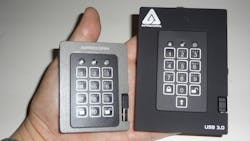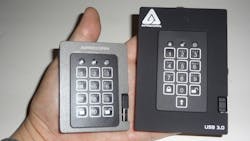It has been rather hectic the last few weeks. I've been traveling around the country to shows like EE Live (see “Gallery: The Best From Day 3 at EE Live 2014”) and the Freescale Technology Forurm (see “Robots At FTF 2014”). Normally I carry a work laptop but I also like to bring along storage for my data. This includes things like passwords and documents I keep at home but might need on the road.
Related Articles
- Checking Out Biometric Security
- Secure USB 3.0 Hard Drive
- Hard Drives, iPhones And Fingering Security
- Robots At FTF 2014
- Gallery: The Best From Day 3 at EE Live 2014
I also pick up a small handful of flash drives with the usual product info and press releases. I tend to carry a blank one just in case I need to get a screen shot when someone is showing me a demo. That means I have lots of these around and some are rather large. I even have a wireless version that can stream videos to the laptop or my tablet (watch “SanDisk Unveils 64GB Connect Wireless Flash Drive”).
Unfortunately very few of these devices are secure. I can use something like TrueCrypt or other encryption application to create an encrypted folder on these flash drives but it means that I need the application. That is not an issue with my laptop and I do use those as well but is not portable.
That is why I usually pack an encrypted USB drive that contains this information. My latest Apricorn's Aegis Padlock SSD (Fig. 1). This solid state drive has a robust aluminum enclosure that is crush resistant rated at 6500 pounds. Like the larger Aegis Padlock Fortress, the Aegis Padlock SSD is FIPS 140-2 Level 2 Validated. It uses real time, 256-bit military grade AES-XTS hardware encryption. Both have a USB 3.0 interface. The Aegis Padlock SSD has a transfer rate that tops out at 230 Mbytes/s. They are dust and water resistant.
The newer Aegis Padlock SSD is available in 120, 240 and 480 Gbyte versions. This provides plenty of storage and I actually use it as a backup for all my important documents.
The nice thing about these drives is that they work with anything because the locking mechanism is built into the hardware. I punch in a combination and press the unlock key when the device is plugged in to gain access to the drive. It works with Linux, Windows and the Mac using any format desired.
I have used the biometric version of Apricorn's USB storage devices (see “Checking Out Biometric Security”). I normally have no trouble unlocking it but my wife tends to have issues sometime. That is why we tend to share the keyboard versions since we have never had an issue when entering a combination.
The fingerprint version of the drives recognize up to five fingers but there is no master finger. The keyboard versions do have a master password. I have always found this feature useful. Companies typically have this as a requirement. The master password provides access to the device in addition to providing control over additional combinations. The system also allows a self destruct PIN that destroys all data. A timeout can also be selected to lock the drive after a certain idle time.
The system is a little picky about the combinations or person identification numbers (PIN). PINs must be at least 7 digits but no more than 16. Repeated numbers and sequential number sequences are not allowed for forget about using 1234567.
The system can be reset but that erases all data from the disk. Data can only be accessed after a valid PIN is entered. Multiple user PINs can be created. The admin PIN also allows user PINs to be deleted but all must be deleted. If a user PIN needs to be retained then it must simply be added again after the reset. All PINs provide access to all of the drive's contents.
The new drive fits nicely in my pocket. I normally do not travel with the USB 3.0 extension cord that comes with the kit. The drive works with USB 2.0 hosts although it obviously runs a lot slower when transferring data.
About the Author
William Wong Blog
Senior Content Director
Bill's latest articles are listed on this author page, William G. Wong.
Bill Wong covers Digital, Embedded, Systems and Software topics at Electronic Design. He writes a number of columns, including Lab Bench and alt.embedded, plus Bill's Workbench hands-on column. Bill is a Georgia Tech alumni with a B.S in Electrical Engineering and a master's degree in computer science for Rutgers, The State University of New Jersey.
He has written a dozen books and was the first Director of PC Labs at PC Magazine. He has worked in the computer and publication industry for almost 40 years and has been with Electronic Design since 2000. He helps run the Mercer Science and Engineering Fair in Mercer County, NJ.
- Check out more articles by Bill Wong on Electronic Design
- Bill Wong on Facebook
- @AltEmbedded on Twitter

